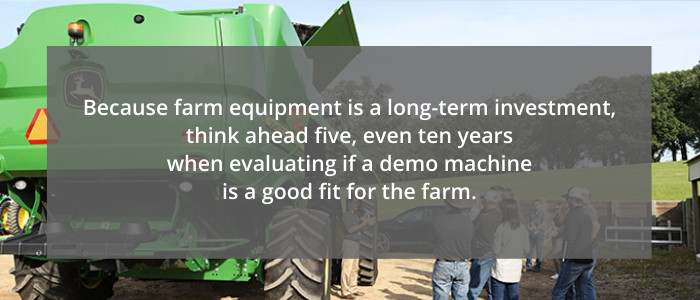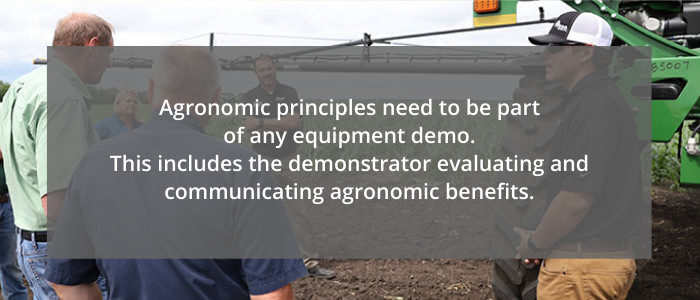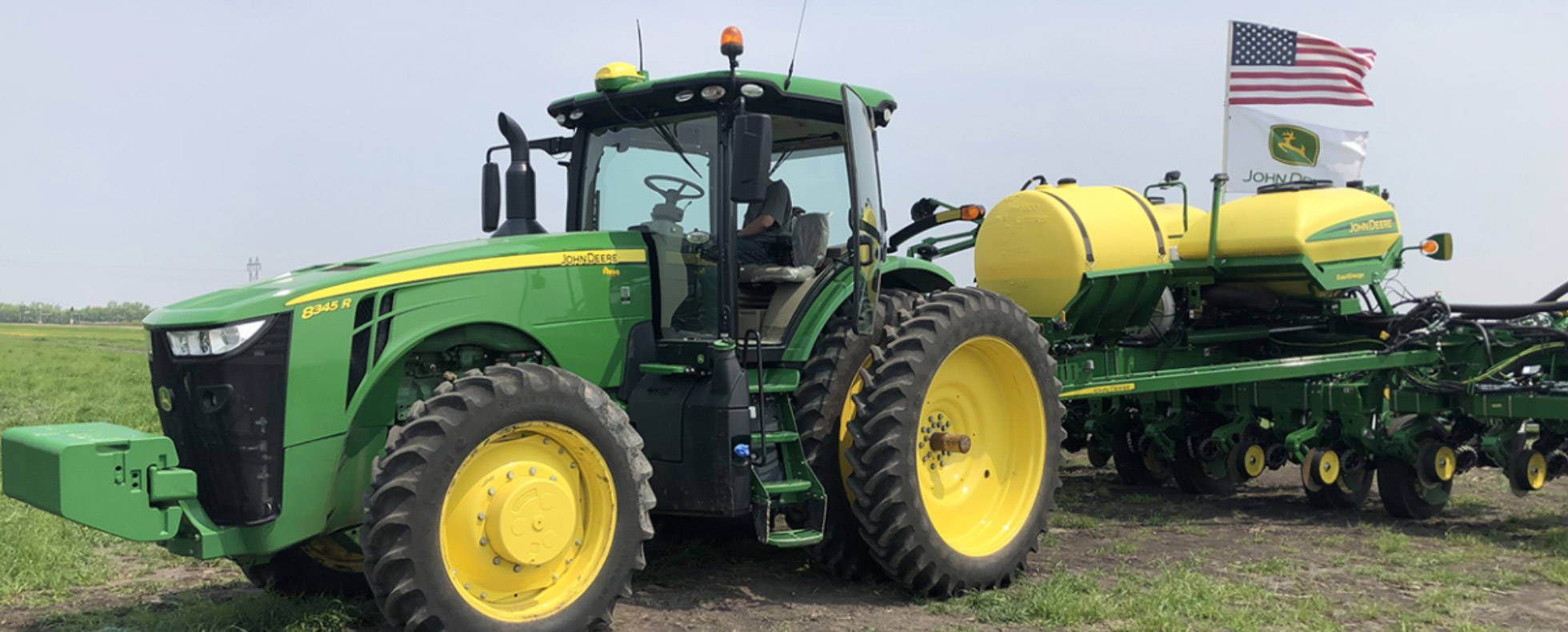It’s common practice for an equipment dealer to approach growers with an opportunity to participate in an onsite demonstration of a new or specific product. In some cases, the grower may have mentioned he or she needs a certain new implement or
maybe the dealer knows a current machine has been in the shop a few times and is recommending an upgrade.
No matter the situation, dealer demos can be a great opportunity for growers. A demo allows them to see a product in motion, on their
property, and with little risk beyond a phone call for proof of farm insurance. While good dealer partners are only interested in demoing machines that would provide advantages to a grower, not all demos are created equal.
It's important
growers ensure these demos are a good use of time, that the dealership consider agronomy needs, and that every demo is tailored to each unique farming operation. And, perhaps most importantly and especially in our current environment, they need to
be safe for all involved.
Let’s take a step back and review the key considerations growers should review to help evaluate equipment demo opportunities.
Note: a version of this article first appeared on CropLife.com.
1. Ensure It’s Worth the Time
With typical farming challenges and how full growers’ days are to begin with, a demo has to be worthwhile. Even
if the dealership representative brings the machine out on time, pre-calibrated, and is ready to go, a demo will still take up valuable time.
Has the dealer partner clearly explained why the demo is valuable? They’d have to know
your current and future agronomy and business goals, as the equipment being demoed would need to prove its worth towards achieving those goals. And keep in mind that farm equipment is a long-term investment; think beyond the next few years and look
five or ten years into the future.
Additional future considerations the demo would need to meet. Examples would be if there’s a thought to try a strip tillage operation in five years. Perhaps there’s work being done towards digitizing
the operation. Or maybe there’s interest in moving to variable rate implementation soon.

Even for growers already interested in the equipment, it’s worth the time to spend just a half hour on the phone
with the dealer to align the demo with the farm’s needs. Build a list of questions based on these priorities and it’ll better prepare both parties for a worthwhile use of time.
2. Ensure It’s Sanitary
Never
in our lives have we been more focused on cleanliness. Who knew there were so many options of what to sing while washing our hands?
These days, everyone needs to be hyper-aware of what someone else could be bringing onto their property. This
goes beyond protecting oneself and extends to also protecting the farm land.
Agronomic
catastrophe can start with weed seeds, pest spores, or more that may be hiding on a machine. Find out how the dealership plans to clean the machine before bringing it out - and keep in mind, cleaning means more than a quick swipe with an antibacterial
wipe.
Upon arrival onsite, don’t hesitate to take a walk around the machinery before it enters a field. Is there anything that looks concerning? The likelihood of a cross contamination issue is low, but it’s worth taking this quick,
extra step.
3. Ensure It’s a Demo, Not a TrainingIt’s not uncommon for a dealership to call it an equipment demo when they’re really preparing an equipment training. Find out if they’re looking
to highlight the step-by-step process of running the equipment or if it sounds like they’re saturating with details that wouldn’t be needed until a post-purchase training.
If it feels like the demo is turning into a training, ask
the dealer representative to slow down, reduce the details (especially if they’re going over details don’t relate to the areas of interest previously discussed), and get back to the focus.
There’s a difference
between informing that the machine has an automated process and showing the systematic process of how to set up a system.
4. Ensure It’s About Impact, Not Features It is easy to show the equipment features, or even
how great the seat lumbar support and cup holders are, but a true demo should be more focused on the impact the machine can have on the operation.
Agronomic principles need to be part of the demonstration, including evaluating and communicating
agronomic benefits. The practical application of agronomic demonstrations allows for acknowledgement and measurement of the variability that is natural in agricultural production such as topography, operator speed variation, and micro-climatic variability.
That’s not to say some time shouldn’t be spent in the cab. Take time to play around with settings, then get out of the cab to see the results. Run the machine, then get out and look at things like incorporation, soil compaction, and
more. This is the time to make sure that a potential purchase is not making an agronomic nightmare in the future.

Also, ask the pertinent questions about the machine’s features that can’t be found in a sales catalog.
How easy is data to move to trusted partners?
What privacy settings are offered to set what I can see – and what I can’t?
Is it possible to log in to an offsite device and see qualitative data on the machine’s performance
or fuel usage?
Has anyone else in the dealership’s territory used the product? This question may be especially helpful, as it will be telling to find out if there’s an early adopter risk worth weighing.
5. Ensure the Dealer is Clear on What’s KeyEven with a quality demo, it’s easy to feel overwhelmed with the amount of information covered, everything from horsepower to fuel efficiencies to agronomic impact.
Don’t worry if, throughout it all, it’s a bit of a struggle
to pay attention and separate the important details from those that aren’t crucial. Because a good demo will include time to analyze the important details with the dealer to help understand the key versus the nice-to-know details.
Also,
don’t neglect to consider details that may seem minor but are important and may not be clearly outlined in the manual.
Are there more or fewer wear parts than my current or similar machine?
If this is your first tractor with a Diesel
Exhaust Fluid reservoir? Do you know what that means towards maintenance?
Did the dealer go over service intervals?
Again, there is a fine line between too many details and the details that will influence that bottom line of the
purchase so stay focused on the impact and what truly speaks to that.
6. Ensure the Follow-Up is ThoroughAfter the demo is done and the equipment has left, the process isn’t over. A dealership representative’s follow-up
is as important as the demo itself. Following up doesn’t mean simply calling and asking for basic feedback on the machine. A good follow-up process has purpose and is an evaluation for both parties to determine if the equipment is the right fit.
A good follow up will be measuring the agronomic benefits weeks after the effect. Impact may be variable depending on growing climate, soils, and other management factors.
A good follow up will include answering questions they were
not able to answer the day of the demo.
A good follow up will discuss data. If they collected any data with integrated technology, have they shared how that could be integrated with existing data?
Equipment isn’t one-size-fits-all
and acknowledging these additional factors, post-demo, will help to see if the equipment is a fit for your unique needs – and speak volumes to the dealership’s interest in setting you up for success vs. trying to sell the most expensive machine.
Demonstrations are a great way to see how a new option fits into your operation. Make sure it’s poignant, relevant, and customized to lessen risk and reap maximum reward.
--
About the AuthorErin
Hightower has been working in farm planning and agronomy for 14 years. At RDO Equipment Co., she works with team members and growers in the Northwest region, focused on education and training, and conducting field trials. She’s a regular contributor
to
globalagtechinitiative.com and
CropLife.com, a Certified Crop Advisor (CCA), and Certified USDA
NRCS Nutrient Management Planner, Certified Conservation Planner, and Comprehensive Nutrient Management Planner. Connect with her on Twitter
@RDOErinH.
Learn
more about
precision agriculture from RDO Equipment Co. Browse listings of available
used agriculture equipment for sale or find options by visiting your
local RDO Equipment Co. store.


